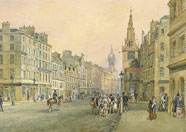By Jay Stringer
It's funny how time changes us in small ways. (It's not funny how it changes us in big ways. No sir. Can I have my mid-twenties body back, please? Not even all of it. I'd settle for half. On a time share.)
When I worked in bookselling I was the crime buyer for the store. In between heading out into the town to buy some great robbery, vice, larceny and murder (ho, snap, see what I did there?) I would also order books.
I loved my section. I still do. I look back on it with pride, and at getting people in the town to read Jim Dodge, Jim Thompson, and some other Jims that I'm probably forgetting. I ordered in books from America, and I sold A LOT of Matt Scudder.
One thing I never really embraced was the true crime section. Reps would come and pitch their books, and I'd order a couple of each, and we stocked a lot of books about football hooligans that were stolen by men with shaven heads and tattoos (says a man with a shaven head and tattoos.) And I guess I pre-judged it. I didn't want to know.
A couple of years later as I embraced the writing gig much more -as I crossed that line from being the guy in a shop who says he wants to be a writer, to being that guy who works in a shop and spends all his spare time writing- I learned to love true crime. I learned to find the good stuff, to focus in on the human stories, and the real histories and the facts. More than anything, I suppose, I learned that it was a great place for me to steal ideas.
There was another section in the store. Local History. Most bookstores have them, certainly if they have any sense, but few of them are like this one. This section was run by a woman named Eileen. She was a bit mad, but also brainy as hell and she loved that section. And once again, I prejudged it. I always fought for it's place in the store whenever head office wanted to move it, and I always fought for Eileen to have as much purchasing power as we could give her, but that was because I could see the amazing sales figures. I can't say I ever truly understood it.
I'd see local people come in, most of them of 'a certain age' and buying the books as much to reconnect with a childhood memory as to learn something new, and I met the authors (often 'of a certain age' and writing in their spare time.) There were a few colourful characters, a few professors and a few local celebrities. I was happy to encourage and support it, but I wanted no part of it.
We moved across Glasgow to a new apartment towards the end of last year. I became fascinated with the history of the are we moved to, of long forgotten railway stations, of hidden buildings, of the people who used to gather in the park across the road to hang their washing, and of the many protests and demonstrations that had happened in that park over the last few hundred years.
I learned that I am a local history guy.
On some levels I've known this for awhile. After all, I'm the one who keeps banging on about social fiction, and about the history of the Midlands, and of all the important details I try to catch in my books. But I'd never been bitten by this bug for anywhere outside of my hometown area or my dream city of New York. This was something new.
I realise now, several years to late to take an interest in Eileen's local history section or to talk to the authors in a way they'd appreciate, that local history is history on the level that matters. We can all learn of the big changes in governments and kings, of the rise and fall of pretend things like money and politics, and of what excuse was used to go to war with whom and when. But local history is where you find people who care about the human stories. Real history is human stories. It's the people who find ways to carry on with their lives beneath all those big things that make it into the textbooks. It's the buildings and shops that come and go, the families who move away, the families who stay, the accents and the dialects and the stories they tell.
I've learned that If I'm to really become the kind of writer I want to be, the one I'm constantly working towards, then it's on this level that I need to read. I spent six years in Glasgow reading the news, and looking at the big historic events, and failing to make enough of a connection to think of a project set here that was worth tackling. I've spent two months since moving reading up on local history, and people, and small events, and understanding the streets around me.
I think I may have something soon.


2 comments:
Funny that you post this now. I'm working on the third book of a series set in a fictionalized version of three small towns I grew up in and near to. I haven't lived there in thirty years, but still go back to visit my parents, and I find I have a much higher interest in the area's history--all of the Pittsburgh area's history--than I ever did when I lived there.
Jay, I have to think you are right on target here.
Local is where everything matters most. A gangland slaying in New York is a headline. A murder in your town is talk in the coffee house and in the bar. Down the street from you and it's at the breakfast table.
I like that feeling in a book.
Post a Comment